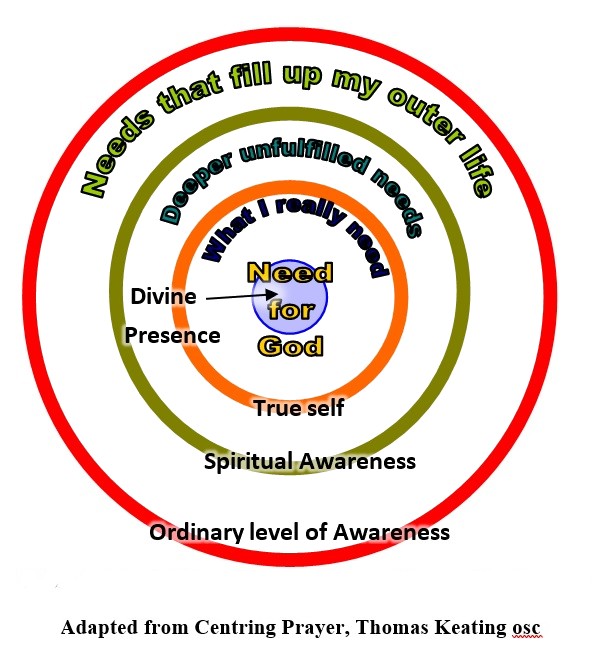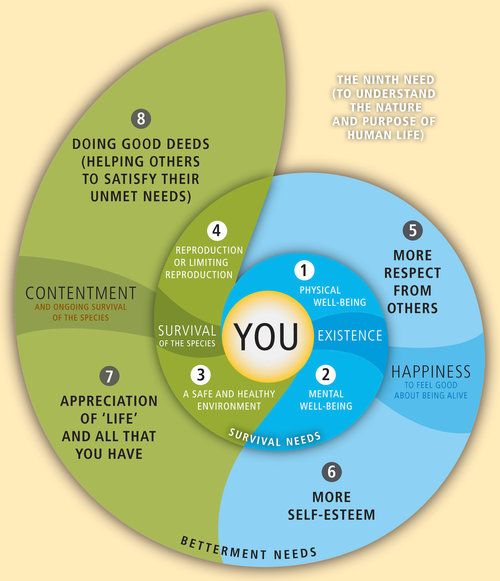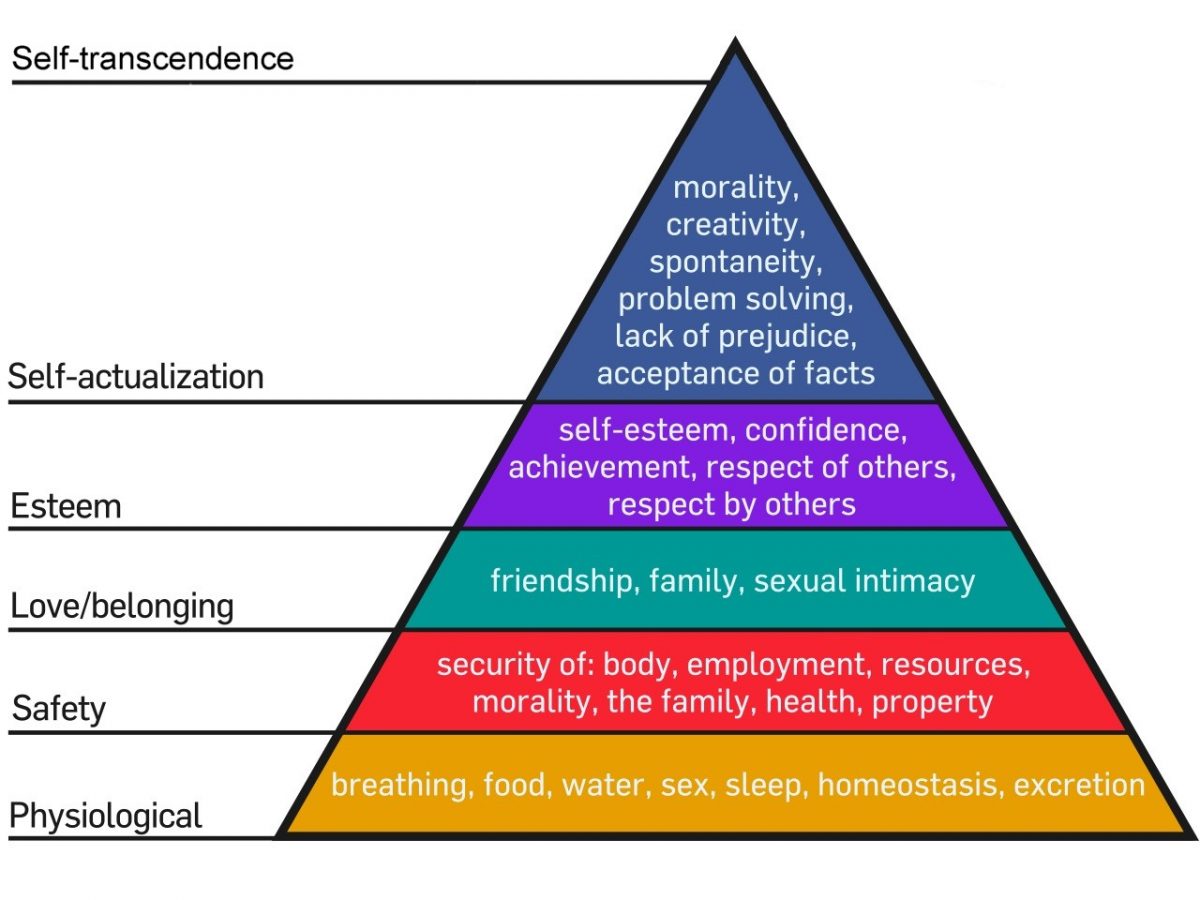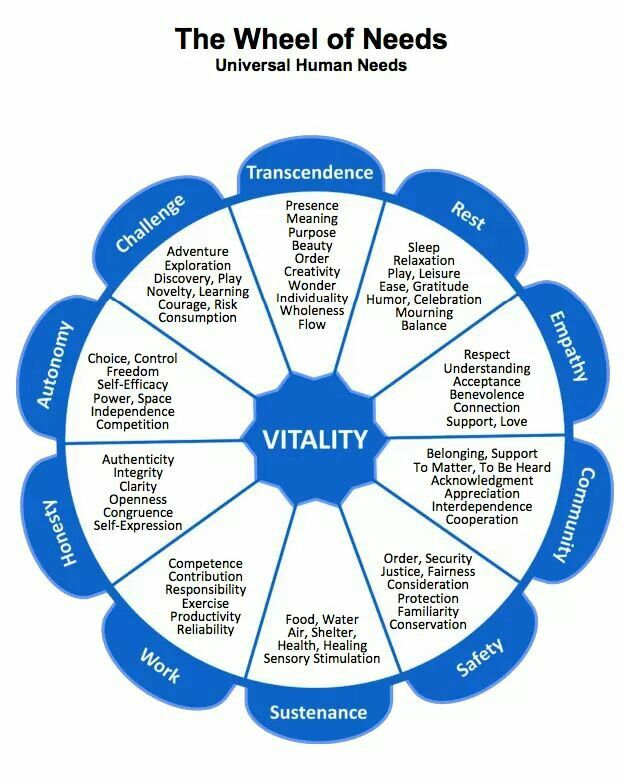
This is the sixth section in this series of reflections on self-understanding for the sake of mission. In this section we discuss in more detail the differing dimensions of human needs, in order to gain some understanding of how we, as MSC, are influenced by our own needs.
The Function of Needs
A need is a condition within oneself waiting to be fulfilled. Needs communicate to us primarily through physiological signs and symptoms, such as hunger, thirst, desire, craving, etc. Through such symptoms, needs alert a person to the fact there is imbalance within the system. Perhaps something is missing, or there is too much of something else. Nature abhors a vacuum and strives to correct the imbalance by bringing the whole system back into homeostasis. Needs exert an internal force or impulse in order to be satisfied, this motivates the person to act. Needs ‘action tendencies’ are therefore associated with the emotions. They are felt as ‘dominant’ or ‘driving’
Needs are experienced at several different levels and with varying degrees of intensity. Simple needs that are easily met by my outer environment are felt with less intensity than deeper needs not so easily satisfied. Spiritual needs leave an ambient desire or longing in the system as the object of fulfillment is less immediately available to satisfy the need and the need is located much deeper within the human condition.

A need is a potentiality or readiness to respond in a certain way under certain given circumstances… It is a noun which stands for the fact that a certain trend is apt to recur.
A major assumption of Henry Murray’s theory, was that behaviour is driven by an internal state of disequilibrium. In other words, we have a lack of something, and this drives us. We are dissatisfied and we desire something.
[Henry Murray (1893-1988) was active in developing a theory of motivation from the 1930s to 1960s. Murray’s Needs-Press Model theory is seen as a drive theory of personality.]
He classified needs as being either:
- Primary needs (which are biologically based): food, water, air, sex, avoidance of pain.
- Secondary needs (which either derive from our biological needs or are inherent in our psychological nature):
- achievement, recognition, acquisition
- dominance, aggression, autonomy
- affiliation, rejection
- nurturance, play, cognizance (asking questions of others)
Murray believed that stronger needs are expressed more often over time and lead to more intense behaviour. He understood personality as being driven by the secondary needs: Achievement, Dominance, Affiliation and Nurturance. The extent to which each of these needs was felt by an individual shaped their personality and behaviour.

The need for achievement (or Achievement Motivation) was studied extensively by David McLelland in the 1970s, and is the single most researched need. Achievement motivation refers to the desire to do things well, overcome obstacles, to do things better. A person high in achievement motivation tends to choose more difficult tasks than a person low in achievement motivation, because they want to find out more about their ability to achieve.
The need for power was studied intensely by David Winter in the 1970s. The need for power is the desire to have dominance, impact on others, prestige, position, and influence over others. Those who have a need for power are often concerned about controlling the image of themselves that is portrayed to others. If the need for power can be combined with taking on responsibility, then “acceptable” displays of power can be experienced.
The need for affiliation has been studied by McAdam in the 1980s. The need for affiliation refers to the desire to desire to spend time with other people. It can be more useful to look at subcomponents such as social comparison, emotional support, positive stimulation, and attention from others.
The need for intimacy is the desire to experience warm, close, and communicative exchanges with another person. Ultimately, it is the desire to merge self with another. The need for intimacy correlates to some extent with the need for affiliation, but focuses more on one to one interactions, particularly self-disclosure and listening.
Not long after that, the younger son got together all he had, set off for a distant country and there squandered his wealth in wild living. After he had spent everything, there was a severe famine in that whole country, and he began to be in need. So he went and hired himself out to a citizen of that country, who sent him to his fields to feed pigs. He longed to fill his stomach with the pods that the pigs were eating, but no one gave him anything. “When he came to his senses, he said, ‘How many of my father’s hired servants have food to spare, and here I am starving to death! I will set out and go back to my father and say to him: Father, I have sinned against heaven and against you. I am no longer worthy to be called your son; make me like one of your hired servants.’ So he got up and went to his father.
Luke 15:13-20
Basic Human Needs can be Grouped within 6 Categories:
[Fr. Alatini Kolofo’ou SM]
Abraham Maslow’s hierarchy of needs is a motivational theory in psychology comprising a five-tier model of human needs, often depicted as hierarchical levels within a pyramid. Further perspectives of understanding recognise a sixth category that being our need to transcend ourselves.

1. Physiological Needs
Fundamental and basic needs required for human survival; food, water, shelter, avoidance of injury, pain, disease and discomfort, stimulation of the senses…sight, touch, smell etc.
2. Safety Needs
These focus on the creation of organization, routine, familiarity, order and direction, and the need to know ‘what is to come next.’
3. Love or Acceptance Needs
Focused on the level of relationships, these include the need for love and affection; or on a sense of belonging, to be part of a larger group. When these needs are not met, feelings of rejection and isolation result along with feelings of mistrust and suspicion towards others.
4. Esteem Needs
The need for reputation, recognition, attention, achievement and confidence. To be somebody.
5. Self Actualization Needs
The need to fulfill one’s abilities, dreams and potential. These needs have a strong motivation force when other basic human needs have been met.
6. Self Transcendence Needs
The need to go beyond oneself. To do better. To overcome human limitation.
Need Deprivation in Action
We have already mentioned in Section 3, the role of Unmet, Inflated and Distorted Needs. Some of our basic needs were never met during the early years of our lives. For example, we needed affection, but did not have our need for affection met in any substantive way and so the need remains unmet within us. This remaining unconscious ‘memory‘ of an emotional deficiency, is felt in such a way, that the organism of the body continues to feel that something is missing. So, we continue at some level to hanker for the fulfilment of that need. Importantly, we are only conscious of some of our needs. Many of our needs remain unknown to us within the unconscious content of our psyche and inaccessible to our daily decision making. It is not the fact that we have needs that causes our problems, but how they drive or push us to meet them unconsciously that lands us in compromising situations. Here we have a look at some of the unmet needs and the characteristic behaviour attributed to them according to the six categories of needs.
All you need to say is simply ‘Yes’ or ‘No’; anything beyond this comes from the evil one.
Matthew 5:37
| UNMET NEED | Characteristic Adult Need Deprivation Behaviour |
|---|---|
| PHYSIOLOGICAL NEEDS | Hoarding, “pack‑rat” behaviour, frugal, chronic anxiety, easily frustrated, difficulty sharing, overly focused on some physiological need (food, environment, etc.) |
| SAFETY NEEDS | Fear of separation or physical harm, rigid, clings to what is familiar, fights change, finds moving very difficult and adjusts slowly to moves, feels rootless, helpless, fearful, can’t take risks, can’t tolerate ambiguity, dependent |
| ACCEPTANCE NEEDS | Chronic loneliness, feels alienated, strange, not really part of a group, clinging in friendship, may do things to get attention, frequent illnesses. and hospitalizations, low self‑esteem, sometimes seems shallow or phony to others, problems trusting people, preoccupied with finding a friend, fitting in somewhere, may try to use ministry or parenthood to meet needs to be needed; doting of others. |
| ESTEEM NEEDS | Secretly compares self to others, competitive, feels inferior, often jealous, may be controlling in relationships, daydreams about great accomplishments, exaggerates accomplishments, seeks prestige, power, recognition; often can’t follow through with responsibilities when power is attained, may over‑achieve to prove self, may attempt to do something he or she lacks capacity for, likes to be in the limelight, may seem insensitive to others’ needs or very narcissistic. |
| SELF‑ ACTUALIZATION NEEDS | Feels restless, unfulfilled, dissatisfied with self, bored, has regrets about life, may become bitter, negative, searching, or aloof. |
| SELF‑ TRANSCENDENCE NEEDS | Self‑indulgent, overly focused on self, brags about accomplishments in life, never satisfied, selfish, careless, restless, sense of emptiness, may always be “on the go” to fill the void or may become a loner. |

Descriptions of Some Basic Needs
The following are some of the well know needs. Click the arrow to open the accordion. Reflect on these and ask yourself which of these you recognise in your own life.
Abasement:
Feeling guilty when one does something wrong; accepting blame when things go wrong; feeling that personal pain and misery suffered does more good than harm; feeling the need for punishment for wrong doing; feeling better when giving in and avoiding a fight than when having one’s own way; feeling the need for confession of errors; feeling depressed by inability to handle situations feeling timid in the presence of superiors; feeling inferior to others in most respects.
Achievement:
Doing one’s best; being successful; accomplishing tasks requiring skill and effort; being a recognized authority, accomplishing something of great significance; doing a difficult job well; solving problems; being able to do things better than others; maintaining high standards and working towards distant goals.
Affective Dependence (Succorance):
Wanting other’s help when one is in trouble; seeking the support or encouragement of others; having others be kindly, sympathetic and understanding, wanting to receive affection from others; having others feel sorry when one is depressed or discouraged; feeling insecure or helpless without the obvious support of others; wanting to confide one’s difficulties to another. (One‑way relationship).
Affiliation:
Being loyal to friends; participating in friendly groups; doing things for friends; forming new friendships or making attachments; sharing things with friends; pleasing a friend; readily accepting people; doing things with others. (Two-way relationship).
Aggression:
Attacking contrary points of view; telling others what one thinks about them; criticising others publicly; making fun of others or telling them off when disagreeing with them; getting revenge for insults; becoming angry; blaming others when things go wrong; enjoying argument or conflict.
Autonomy:
Being able to come and go as desired; saving what one thinks about things; making decisions independently of others; doing unconventional things; avoiding having to conform; doing things without regard to the opinions of others; criticising those in authority; avoiding responsibilities or obligations; feeling free to do whatever one wants.
Infavoidance, Avoid Censure, Failure:
Defending oneself against real or imagined criticism; taking offence easily; not accepting criticism easily; avoiding blame, concealing mistakes; justifying one’s actions; hiding humiliations from others. Avoiding failure or humiliation; abandoning actions or projects for fear of failure; withdrawing when embarrassed, avoiding anything that may cause scorn, derision or indifference from others; (passive conformity).
Counteraction:
Persisting in overcoming difficulties, failure, frustration, humiliation or embarrassment; working at a job until it is finished; working for long hours without distraction; wanting to solve a problem or difficulty; patient and persevering in work.
Domination:
Arguing for one’s point of view; being a leader in groups; settling arguments or disputes between others, influencing and persuading others to do what one wants; supervising and directing the actions of others; being looked to by others for leadership.
Exhibition:
Saying witty and clever things; amusing others and being the centre of attention, saying or doing things to see how others will react; asking questions or using words or making comments that impress others or display one’s superiority; talking about one’s achievements and adventures; enjoying drawing attention to oneself by being exciting, shocking or amusing.
Knowledge:
Wanting to know or understand areas of knowledge; satisfying curiosity; wanting to explore new things; liking acquiring information; valuing ideas and generalisations; wanting to be logical and ordered; disliking ambiguity; wanting information for decisions.
Nurturance:
Helping others in trouble; assisting others less fortunate; treating others with kindness and sympathy; forgiving others; wanting to do favours for others; wanting to show affection for others; having others confide in one about their problems; feeling sympathetic to those in need.
Sexual Gratification:
Wanting to develop erotic relationships; liking to flirt; looking for chances to socialise with members of the opposite sex; seeking physical contact in kissing or caressing; being regarded as physically attractive by someone; seeking sexual excitement or sexual intercourse; wanting to discus, read about or see things concerned with sex.
Social Recognition:
Gaining prestige; winning recognition and approval from others; wanting others to think highly of one; being concerned about one’s reputation and what others think of one; being very conscious of the impression one makes on others; wanting others to say how well one has done.

In a constant effort to share in the sentiments of the Heart of Christ, we will be attentive to all human needs and aspirations, such as, the need to be respected as persons, the need for love and peace, for freedom, justice and truth, and the search for meaning in life. We will become all things to all people, by respecting different cultures, and by being ready to undertake whatever apostolic services people may need.
MSC Constitutions & Statutes # 24
In our next section we shall proceed to explore the dynamics of needs that are consistent and inconsistent with the Gospel values. This will shed light on why our behaviour some times puzzles us, when we know what we should do but we fail to do so. Till next time.
